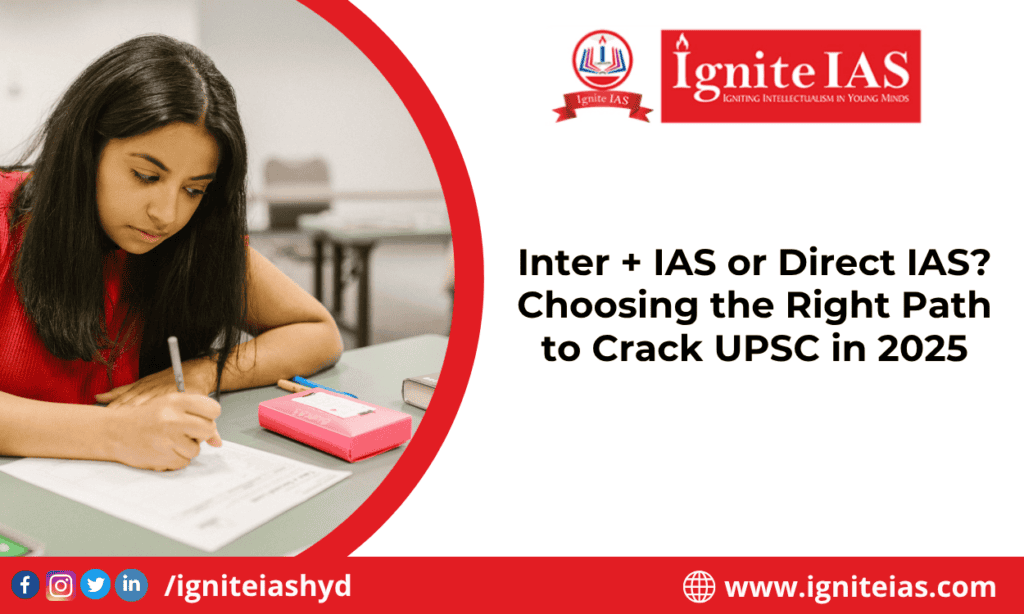Introduction
Cracking the UPSC exam isn’t just about hard work; it’s about smart choices—starting with when you begin your preparation. Should you wait till graduation and then start your IAS journey? Or should you begin early, right after Class 10, with an Inter + IAS program?
This decision is like choosing between boarding a train early with a reserved seat or rushing in last-minute hoping there’s space left. Both can get you to your destination, but one is clearly more comfortable and time-efficient.
Let’s explore both options and understand how Ignite IAS, Hyderabad’s top IAS academy, helps students choose the right path to crack UPSC in 2025 and beyond.
1. What is Inter + IAS?
A head start like no other.
Inter + IAS refers to a specially designed program that combines Intermediate education (MEC/CEC/Humanities) with a strong foundation in civil services preparation. At Ignite IAS, this means students are exposed to UPSC-related subjects right after their Class 10 board exams.
They don’t wait. They begin early, grow gradually, and by the time they reach their degree, they’re already ahead of most.
2. What is Direct IAS Coaching After Graduation?
The traditional route—but is it too late?
Direct IAS refers to starting UPSC preparation after completing your bachelor’s degree. While it’s a well-established path, it compresses UPSC learning into 1–2 years, which can be overwhelming for many, especially if there’s no prior exposure to subjects like polity, geography, or economics.
3. The Age Factor: Start Early or Start Later?
Time is your biggest advantage—if you use it right.
UPSC allows candidates to attempt the exam till 32 years of age (for General category). Starting early with Inter + IAS gives students multiple attempts before they even turn 25, offering more flexibility and less pressure.
In contrast, starting at 22 or 23 post-graduation means fewer chances and higher stakes with each attempt.
4. Foundation Building: Why Timing Matters
Would you build a skyscraper without a strong base?
The key UPSC subjects—History, Polity, Geography, Economics—are best absorbed gradually. Inter + IAS programs, like those at Ignite IAS, break down these topics across years, allowing deeper understanding and longer retention.
With Direct IAS, students often rush through the same content in months, which might lead to shallow preparation.
5. Advantages of Inter + IAS Coaching
The earlier, the smarter.
- Time Efficiency: Simultaneous academic and UPSC prep
- Reduced Pressure: More time to grasp complex subjects
- Early Exposure: Develops analytical thinking from teenage years
- Strong Base for Optional Subjects: Students can make informed choices by degree level
At Ignite IAS, this model is supported by curated study material, time-tested faculty, and UPSC-style assessments right from Inter 1st Year.
6. Pros and Cons of Starting After Degree
It’s never too late, but it may be harder.
Pros:
- Mature mindset
- Clarity about career choice
- Ability to focus full-time on UPSC
Cons:
- Less time, more stress
- No overlap with earlier academics
- Pressure of “this must work”
Ignite IAS offers crash courses and 1-year intensive batches for such students—but it’s a race against time.
7. Ideal Student Profiles for Each Path
Are you the early bird or the late starter?
Inter + IAS is ideal for:
- Students who are clear about civil services early
- Those who want a time advantage
- Parents looking for structured, long-term planning
Direct IAS is suitable for:
- Students who discovered UPSC passion later
- Those with strong academic skills and self-discipline
- Graduates from humanities or public administration backgrounds
8. How Ignite IAS Customizes Learning for Both Streams
One goal. Two paths. One solution: Ignite IAS.
Whether you’re in Intermediate or a graduate, Ignite IAS personalizes your preparation journey. The curriculum, tests, mentorship, and even classroom engagement are tailored to your academic stage.
It’s not one-size-fits-all. It’s one-goal-fits-you.
9. UPSC Syllabus Planning Over the Years
Slow and steady wins the IAS race.
For Inter + IAS students:
- Year 1: NCERT basics, Indian history, geography
- Year 2: Polity, economics, environment
- Year 3 & beyond: Optional subjects, essay writing, current affairs
For Direct IAS:
- Everything—Prelims, Mains, Optional—in 12 to 18 months. Fast-paced and rigorous.
10. Stress and Time Management in Both Models
Stress is real—but it can be managed.
At Ignite IAS, Inter + IAS students follow a structured routine with balanced study hours, recreation, and mentorship. This long-term approach spreads the workload.
Direct IAS batches have a compact calendar, which means higher study hours and intense mock tests. It works, but needs mental toughness.
11. Success Stories from Inter + IAS and Direct IAS Tracks
Different paths. Same destination.
- Rohit (Inter + IAS): Joined Ignite after 10th, cleared UPSC by 24
- Ananya (Direct IAS): Started after B.Com, used Ignite’s crash course, cracked prelims in first attempt
These real stories show that both routes can succeed—with the right strategy.
12. Role of Mentorship and Faculty Support
Even the brightest minds need direction.
Ignite IAS assigns each student a personal mentor, whether in Inter or Degree. Faculty include subject experts, former bureaucrats, and interview panelists. From doubts to motivation, support is always a door-knock away.
13. How Campus Environment Impacts Learning
Your surroundings shape your success.
Ignite’s campuses are designed for focus—AC classrooms, libraries, hostels, and daily current affairs sessions. Inter students enjoy holistic growth, while direct IAS batches benefit from an exam-centric atmosphere.
14. Long-Term Strategy vs Short-Term Focus
Would you rather marathon or sprint?
Inter + IAS is a long-term marathon: steady pace, consistent energy, high success rate.
Direct IAS is a sprint: short burst, maximum focus, high risk-high reward.
Ignite IAS helps students pick the one that suits their mindset and resources.
15. Final Verdict: Which One’s Right for You?
It’s not about right or wrong—it’s about fit.
If you’re in school and already dreaming of becoming a civil servant, Inter + IAS is your express ticket.
If you’ve finished your degree and have the discipline to commit full-time, Direct IAS can still work wonders.
Whichever path you choose, Ignite IAS is the partner you need to make it happen. With expert guidance, well-structured curriculum, and a results-driven approach, Ignite IAS lights the way—no matter when you begin.
Frequently Asked Questions (FAQs)
1. Can I switch from Inter + IAS to regular degree midway?
Yes, but it’s not advisable. The integrated program is designed for long-term success. Switching may disrupt progress.
2. Is Direct IAS only for students with a humanities background?
Not at all. Even engineering or science graduates can succeed with the right coaching and strategy.
3. How does Ignite IAS support weak students in Inter + IAS?
Through daily doubt sessions, weekend revisions, and one-on-one mentoring, Ignite helps every student improve steadily.
4. Can I start UPSC prep after completing B.Com or B.Sc?
Yes! Ignite IAS offers tailored batches and crash courses for graduates who want to start their UPSC journey post-degree.
5. Is hostel facility available for Inter + IAS students?
Absolutely. Ignite IAS provides secure residential campuses with study hours, discipline, and recreational balance.




